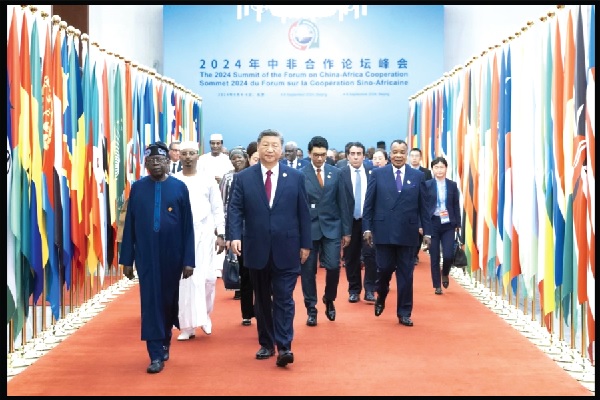As the global trade landscape undergoes significant transformation, the African Growth and Opportunity Act (AGOA), which has been the lifeline to many African economies, has not been spared.
The recent introduction of a 10-per cent tariff on all African exports to the United States, a policy enacted by the Trump administration, has led to a substantial decline in the effectiveness of AGOA.
Originally established in 2000, AGOA has provided preferential access to the U.S. market, allowing eligible sub-Saharan African countries to export about 2,000 products at zero tariffs. This initiative has been a cornerstone of US-Africa trade policy for a quarter of a century since its inception.
AGOA
However, this new tariff regime undermines AGOA’s benefits, particularly impacting countries such as Ghana, which have heavily relied on foreign exchange from exports to the United States.
In light of these challenges, the recent announcement of China’s zero-tariff policy for Least Developed Countries (LDCs), effective from December 1, 2024, including 33 African countries, presents an unprecedented opportunity for Ghana.
This policy shift comes at a crucial time when President Mahama’s vision for a 24-hour economy is aimed at enhancing production for both local consumption and exports.
Ghana can strategically harness China’s zero-tariff initiative to revitalise its economy and strengthen local markets.
The key to achieving this lies in a robust alignment of policies and investment strategies that take full advantage of the trade benefits offered by China.
The potential for export growth is not merely an economic advantage. It represents an opportunity for Ghana to develop a vibrant, resilient economy capable of continuous operation.
Central to establishing a successful 24-hour economy is the capability to produce continuously, while meeting both local and international demand.
This means focusing on enhancing Ghana’s agricultural sector, encouraging crop diversification and investing in value addition.
Key commodities such as cocoa, cashew nuts, essential minerals and various fruits possess considerable export potential and should see increased funding in processing facilities.
By transforming raw agricultural inputs into finished products such as chocolate and fruit juices, Ghana can cater to local consumers and tap into the zero-tariff Chinese market.
To bring this vision to fruition, cooperation between the government, local farmers, cooperatives and agribusinesses is essential.
Developing training programmes that impart best practices in production and processing will help local farmers meet domestic and international quality standards.
Additionally, establishing an efficient supply chain that encompasses everything from farms to processing facilities and distribution networks will be vital in reducing post-harvest losses and promoting efficiency.
24-Hour economy
Infrastructure development is equally crucial for a thriving 24-hour economy. Ghana must prioritise the enhancement of transportation networks, storage facilities and energy supply systems necessary for continuous production and distribution.
Reliable roads and energy sources are fundamental for facilitating round-the-clock operations across farms, factories and transport sectors.
Government initiatives aimed at constructing modern logistical hubs near key ports and urban centres can greatly improve trade efficiency.
By enhancing market access—both locally and globally—Ghana can increase domestic consumption and bolster its appeal as a preferred export destination.
Furthermore, partnerships with China could facilitate investment in infrastructure through initiatives such as the Belt and Road Initiative.
This initiative offers a pathway to develop essential infrastructure projects—roads, railways and ports—that can significantly enhance Ghana’s trade capabilities.
Collaborative efforts can lead to energy development projects that power factories, thereby boosting production capacity, and support advancements in digital technology and communications, fostering greater operational efficiency.
The 24-hour economy also hinges on nurturing a dynamic entrepreneurial culture.
Diversification
By encouraging the growth of small and medium-sized enterprises (SMEs), Ghana can diversify its economic structure and stimulate innovation.
Creating a conducive environment for entrepreneurship will require access to financing, mentorship programmes and the reduction of regulatory barriers.
Establishing special economic zones (SEZs) could attract investment and facilitate production by offering tax incentives and simplified operational procedures.
By elevating SMEs and fostering a culture of innovation, Ghana can create a resilient economy capable of sustained round-the-clock operations.
Moreover, preparing the workforce to meet the demands of a 24-hour economy is crucial for ensuring sustainable growth. Investments in education and vocational training aligned with market needs—particularly in sectors poised for growth such as manufacturing and technology—are necessary.
Collaborative efforts involving the government, educational institutions, and private sector actors can develop programmes that equip individuals with relevant technical skills.
Establishing training centres with a focus on entrepreneurship, industrial skills and trade knowledge will create a versatile workforce prepared to engage in continuous production.
Global trade
In conclusion, as Ghana navigates the complexities of a shifting global trade environment impaired by the deterioration of AGOA, the potential to foster a thriving 24-hour economy lies within reach.
By leveraging China’s zero-tariff policies for LDCs, promoting local production, enhancing infrastructure, and cultivating an entrepreneurial spirit, Ghana can embark on a promising economic journey.
Embracing these opportunities will not only help Ghana stand firm amidst global trade challenges but will also pave the way for sustainable growth and prosperity in the years to come.
The writer is a Governance Fellow at the Institute of Economic Affairs
